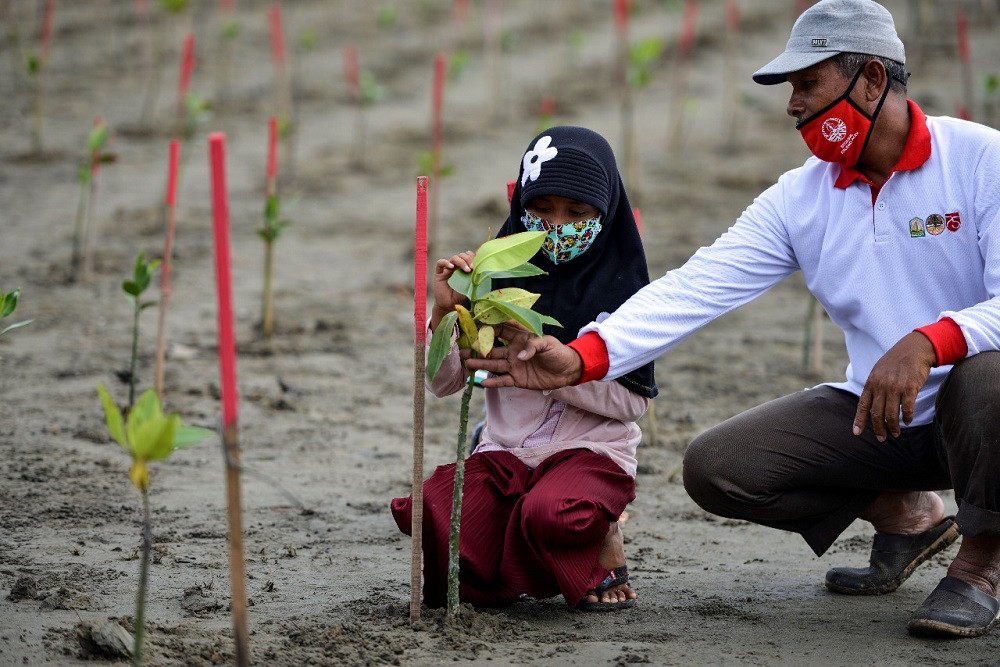Popular Reads
Top Results
Can't find what you're looking for?
View all search resultsPopular Reads
Top Results
Can't find what you're looking for?
View all search resultsReplanting alone won’t stop mangrove degradation: Activists
Natural disasters are just among a slew of negative effects as a result of mangrove degradation, activists warned, as failure to prevent mangrove degradation also harmed biodiversity and caused economic losses for communities that depended on mangroves for a living.
Change text size
Gift Premium Articles
to Anyone
W
hen 53-year-old Azizi is not tending to his crab farm, he would be nursing the 456-hectare mangrove forest near his home in the village of Gambus in North Sumatra’s Batu Bara regency.
The former fisherman said recently that fewer than three-quarters of the nearby mangroves were in good condition, but the same could not be said for the rest of the regency’s mangrove cover, about 70 percent of which is damaged. Some areas were being converted into oil palm plantations or prawn farms, he said.
The mangrove degradation had caused landslides in neighboring villages, he claimed, sinking 30 to 50 houses. He said the dwindling mangrove cover would allow strong wind to pass through, potentially damaging nearby neighborhoods in the future.
“It’s a big risk,” he said on Friday. “We have to be ready to let our houses plunge [to the sea] if we are not ready to preserve our mangroves,” he said.
But natural disasters are just among a slew of negative effects as a result of mangrove degradation, activists warned, as failure to prevent mangrove degradation also harmed biodiversity and caused economic losses for communities that depended on mangroves for a living.
Indonesia currently has nearly 3.5 million ha of mangroves, but over half of them are damaged, the Coordinating Maritime Affairs and Investment Ministry said in a press release in July.
Coordinating Maritime Affairs and Investment Minister Luhut Pandjaitan said on Wednesday that he planned to replant up to 600,000 ha of mangrove forest out of nearly 1 million ha of damaged areas in the next three years, in addition to tackling forest encroachment.
“We must all unite, because we are talking about our children’s and grandchildren’s [future]. So, if we do not take these steps, our children and grandchildren will be most disadvantaged in the future,” he said during a recent webinar.
People's Coalition for Fisheries Justice (KIARA) secretary-general Susan Herawati expressed appreciation for the government's efforts. However, such a decision would conflict with the Maritime Affairs and Fisheries Ministry’s effort to increase shrimp production through shrimp farming, which contributed to more mangrove clearing, as those farms were best built on mangrove terrain.
The government also needs to commit to preventing the conversion of mangrove areas, especially since one circulated version of the new Job Creation Law – in Article 51 – stipulates that “the central government has the authority to determine changes to the status of ‘the core zone’ of National Conservation Areas”.
In addition, replanting efforts required research to determine the type of mangrove that suited each environment, Susan said. Authorities had to involve locals living on the coastlines in such efforts, as they knew the local terrain and sea conditions the best, she said.
“Don’t let this well-intended program merely be ceremonial and a chance to take good photos. We can’t just haphazardly plant mangroves,” she said.
Echoing Susan’s statement, crab farmer Azizi from Batu Bara said only a small portion of mangroves planted in past replanting efforts by authorities or companies in his area had survived due to incorrect planting methods and less-than-ideal locations, among other factors.
“In the end, our replanting efforts were in vain,” he said.
Indonesian Forum for the Environment (Walhi) climate justice campaign manager Yuyun Harmono suspects the mangrove restoration plan is aimed at offsetting carbon emissions, replicating Indonesia’s move in the Indonesian-Norwegian Reducing Emissions from Deforestation and Forest Degradation (REDD) scheme and the Green Climate Fund.
He claimed that goal would benefit the government and corporations, as mangroves capture large amounts of carbon, credits for which could be sold internationally through carbon trading. Such efforts were likely only a ploy to earn grants from the international community rather than to protect people from the climate crises, he said.
Read also: RI secures grant for fighting deforestation
Therefore, authorities should shift their end goal by also paying attention to how the restoration could protect marine biota and empower people living in Indonesia's coastlines and small islands, Yuyun said.
He also urged the government to stop large-scale plantation expansions and infrastructure development that had harmed mangrove forests.
“It’s as if the government is turning a blind eye to past policy failures, [with policies] left uncorrected, and then jumping right into mangrove replanting efforts,” Yuyun said.
While waiting for more concrete solutions, 49-year-old fisherman Hermansyah said on Friday that he supported the replanting scheme, should the program take place at his village in Serdang Bedagai regency in North Sumatra, which has transformed its mangrove forest into an educational tourism spot.
However, he also urged the government to prevent erosion in mangrove forests that had damaged thousands of mangrove trees in the areas. His community had once asked the local administration for help in the matter but nothing had materialized yet.
“What is certain is that the forestry section of the government, both at the provincial and regency level, needs to be more serious when it comes to the environment,” Hermansyah said.










